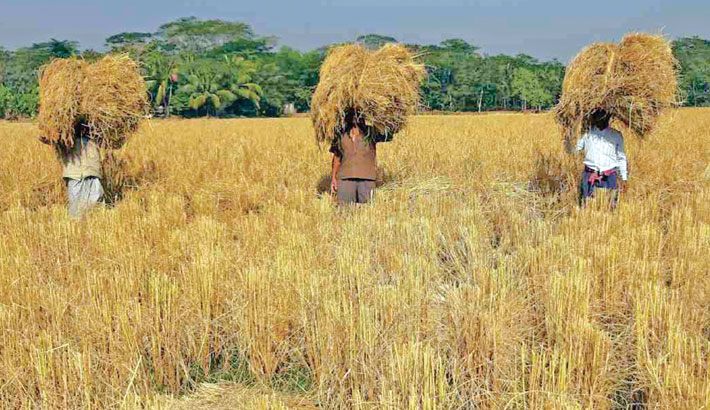ANM Mohibub Uz Zaman
Published:2023-07-21 16:44:24 BdST
Rice production hits record 40m tonnes
Bangladesh has set a record in rice production last fiscal year, reaping an astounding 40.1 million tonnes due to the government's robust food policy that aims to achieve grain self-sufficiency.
Farmers navigated adverse weather conditions to accomplish this tremendous feat, significantly reducing the nation's import dependency.
Dr Md Shahjahan Kabir Director General of the Bangladesh Rice Research Institute (BRRI) attributed the bumper harvest in both the Aman and Boro seasons to the government's assistance in irrigation, the provision of solar radiation, clear sunshine, and various other input services.
These conditions catalyzed the successful 2022-2023 fiscal year, resulting in surplus production.
The Department of Agriculture Extension (DAE) revealed the record-breaking figures, noting that this was the highest yield since the country’s independence.
Of the total production, the Boro season contributed 21.84 million tonnes, the Aman season 15.42 million tonnes, and the Aus season added another 2.9 million tonnes.
The production in the preceding fiscal year 2021-2022 was significantly less at 38.38 million tonnes. Furthermore, the Bangladesh Bureau of Statistics (BBS) showed that the current production far exceeds the 33.5 million tonnes produced in FY 2010-2011.
Agricultural economist Dr Jahangir Alam Khan sees the rise in rice production as a boon to the country’s food security, lessening the dependency on imports.
“The surplus production has no effect in rice market as the government did not take any effective steps to stable marekt. Businessmen are increasing price after reducing supply of rice to the market for creating artificial crisis,” he said.
Over the high price of rice despite bumper production, he opined that if the supply of rice remains low in the market, then the crisis will not reduce despite huge production.
The government should take necessary actions to increase market monitoring in a bid to keep rice market stable, he said.
Dr Kabir pointed out that despite less rainfall, the government ensured sufficient irrigation, leading to the abundant harvest.
He stated that clear sunshine throughout the year also played a crucial role in exceeding production expectations.
“The current demand for rice is 25.2 million tonnes for human consumption, 11 million tonnes for non-human consumption, and we have a surplus of around 4.1-4.2 million tonnes of rice,” Kabir added.
Rice production has quadrupled since the liberation of Bangladesh. With this achievement, Bangladesh has retained its third place in global rice production for the fourth year running, marking a proud moment in the nation's agricultural history.
Unauthorized use or reproduction of The Finance Today content for commercial purposes is strictly prohibited.


